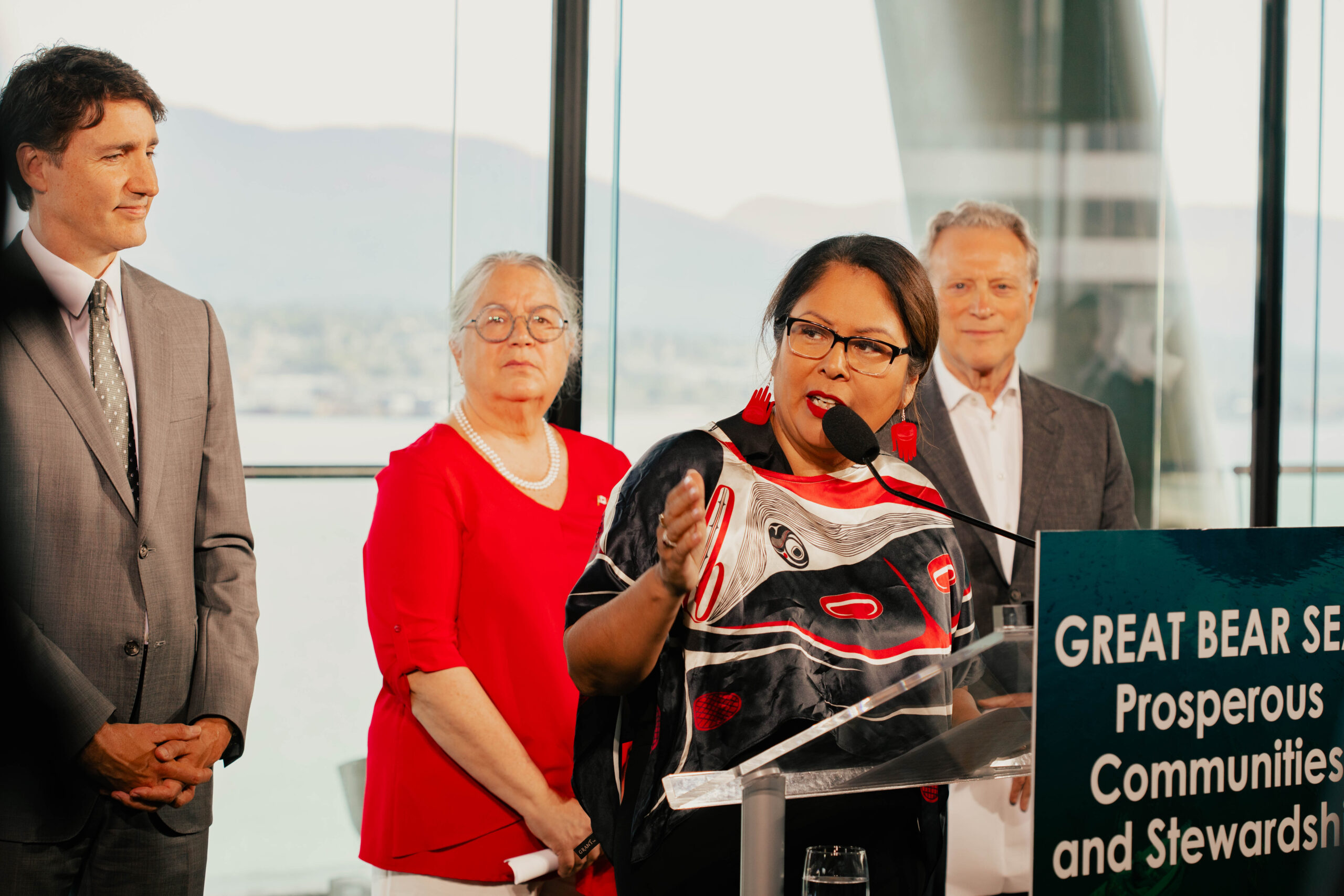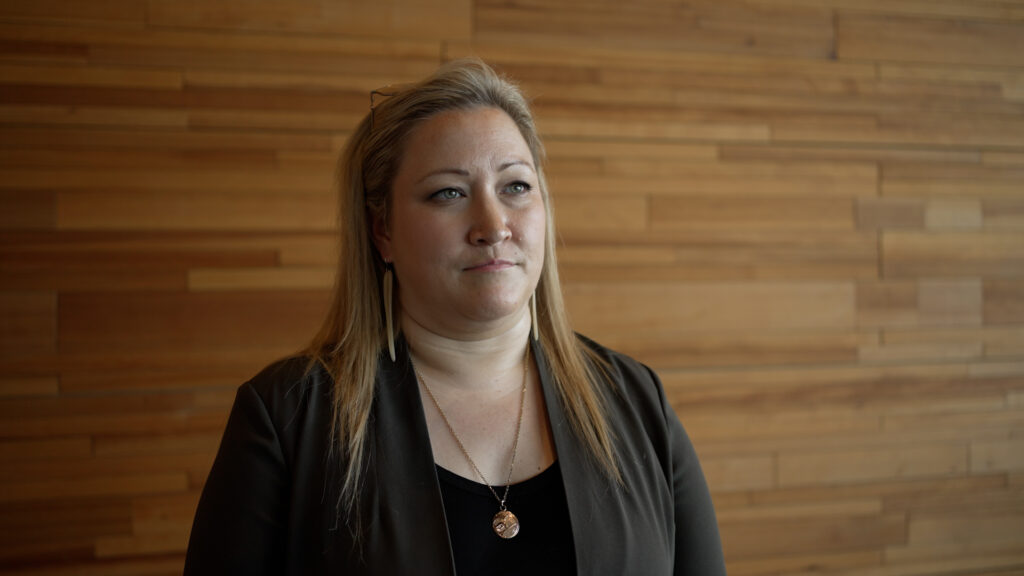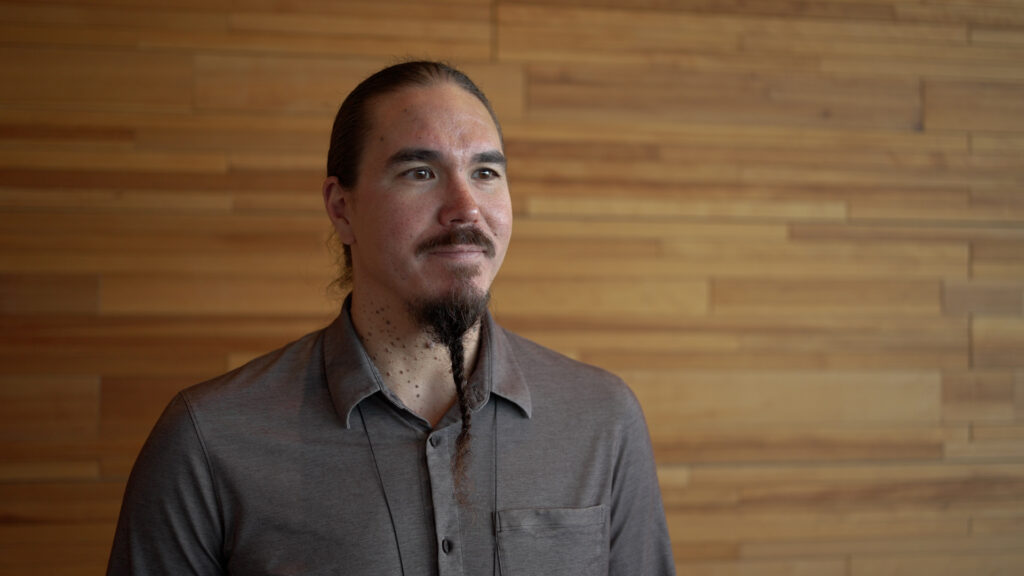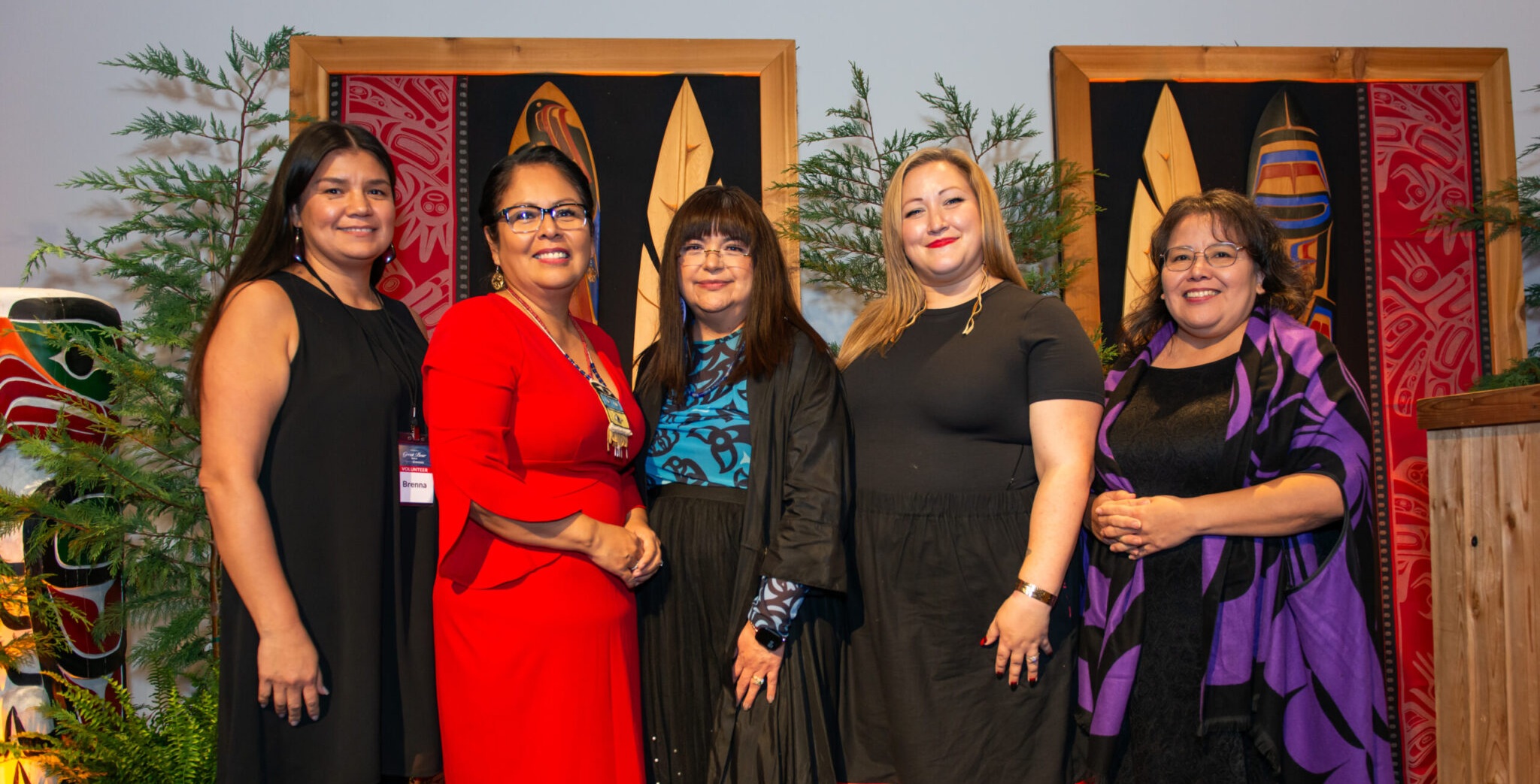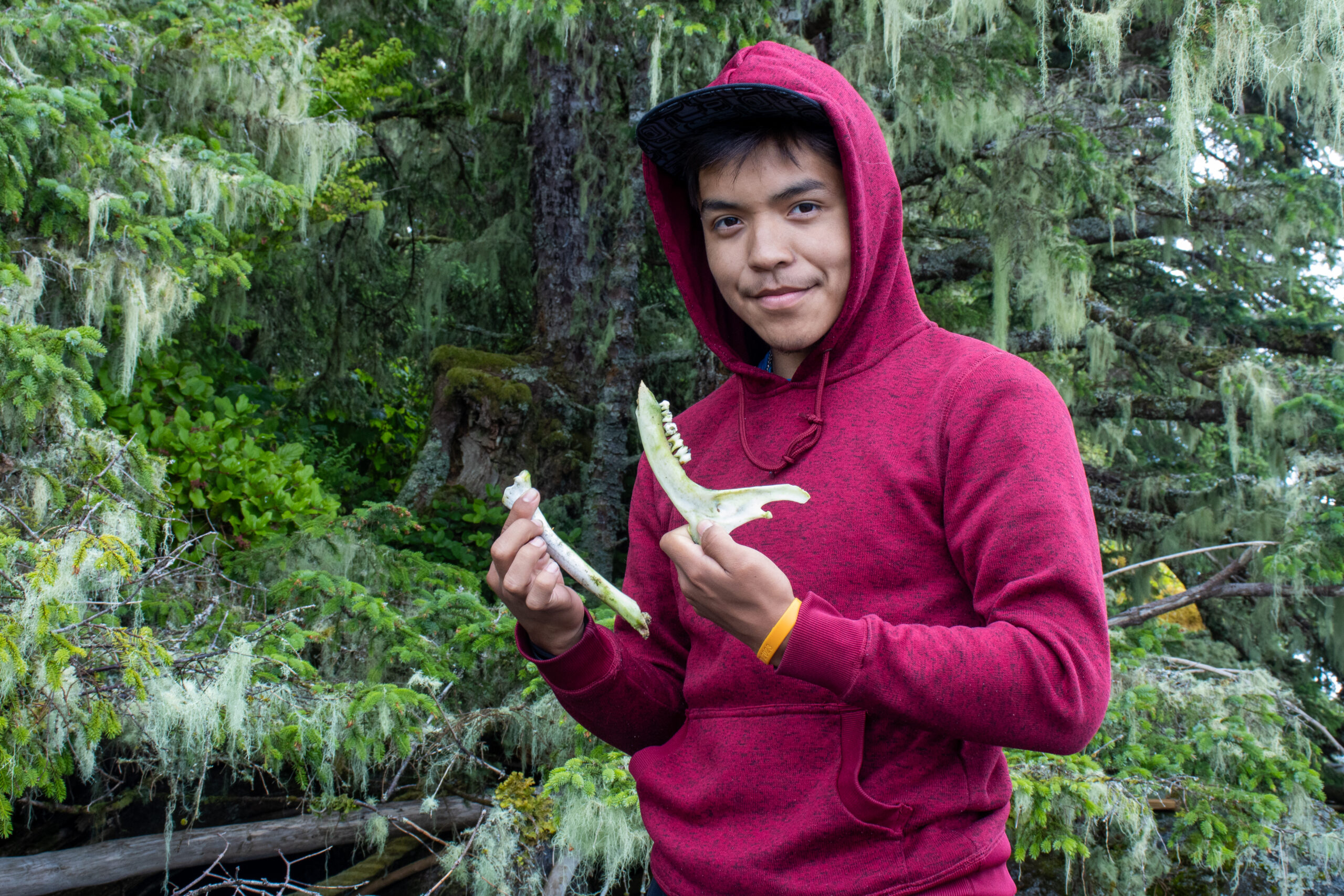First Nations, provincial and federal governments, and philanthropists are working together to invest hundreds of millions of dollars into the wellbeing and future of the coast for all those who call it home. On June 25, parties celebrated the closing of the Great Bear Sea (GBS) Project Finance for Permanence (PFP) — a collaborative funding initiative involving $200 million from Canada, $60 million from BC and $75 million from philanthropic investors.
After the announcement of the closing agreement, λáλíyasila Frank Brown, Hereditary Chief of the Heiltsuk Nation, emphasized the intergenerational commitment of his Nation towards protecting and preserving the coast, and said the PFP investment is the latest iteration of First Nations exercising their responsibilities to the land and water.
“Our people haven’t deviated from that commitment, because we recognize the land and sea look after us. We are seafaring people. We take our sustenance from the sea,” says Brown. “The sea provides our sustenance — not only our physical sustenance, but our spiritual and emotional. Our history and culture has literally been born out of the sea.”
The work done to formalize the protection of the region, Brown says, lines up with the spirit of Heiltsuk traditions, laws and values, and his peoples’ commitment to steward water and lands for generations to come.

Frank Brown is an adjunct professor of Resource and Environmental Management at Simon Fraser University, of Recreation and Tourism Management at Vancouver Island University and is a senior advisor to the Pacific Institute for Climate Solutions hosted by the University of Victoria.
A gift to the world
Brown is a Sr Advisor to the Indigenous Leadership Initiative, a leader in the Pacific coast-wide ocean-going Indigenous canoe resurgence and the executive producer and co-curator of the Sacred Journey traveling exhibit. He has been a mariner all his life — a traditional food harvester and trader, herring roe-on-kelp fisher and the co-owner and operator of Yuwala marine charters. Brown says he’s excited about the GBS PFP because it further supports a conservation economy through proper investments and planning.
“The PFP is an example, not only to our descendants and the next generation who are going to pick up this work, but to the western world who is challenged as well with climate change and biodiversity loss, to those who are trying to figure out a path forward, to do things in a more sustainable and ethical way,” he says. “The people of the Pacific Northwest coast have an amazing history and culture that has been sustainable for millennia, and that’s going to help inform how humanity moves. In some way, that’s our gift to the world.”
Coined the “Great Bear Sea” and also referred to as the “Northern Shelf Bioregion,” the marine region extends from northern Vancouver Island to the Canada-Alaska border. It has been the traditional territory of many First Nations for the last 500 generations, and is one of the richest and most productive cold-water marine ecoregions on Earth, home to abundant marine life, including herring, salmon, whales, dolphins, seabirds, kelp forests — all of them impacted by climate change, biodiversity loss and critical population declines.
A seat at the table
Abúk Danielle Shaw, Chief Councillor of the Wuikinuxv Nation, has experienced first-hand the impacts of unfettered commercial activity, government mismanagement of resources that ignored First Nations’ authorities and expertise, and a rapidly changing climate.
“It’s been really challenging in terms of the management of the resources within our territory. We used to have a prolific ooligan run, which no longer exists. Our sockeye don’t return in the numbers they used to — our river used to run silver for certain parts of the year… With the impacts of commercial fisheries, climate change and warming waters, we’ve been fighting an uphill battle,” Shaw says following the June 25 announcement, while her four-year old daughter stands by her side listening.
“There’s a lot of work to just build up these stocks again. So being able to have a seat at the table, when it comes to these kinds of decisions…helps to make sure we’re moving in the right direction.”
Chief Dani Shaw was elected in 2020, leading the Nation’s first-ever all-woman council. Shaw studied at the School of Business at Capilano University and has applied those learnings to support her Nation, including development of self-governance, traditional foods, health administration and in her role as Wuikinuxv Stewardship Director until 2019.
Shaw says her Nation has been working to protect its territory “forever,” but especially over the past few decades, in formalizing plans that feed into the Great Bear Sea Marine Protected Area Network (MPA Network), a variety of protected areas that operate cohesively at various spatial scales, and with a range of protection levels, to fulfill ecological aims more successfully in an integrated way, rather than individually.
The GBS PFP will provide funding for the collaborative implementation of both the MPA Network Action Plan and the Marine Plan Partnership (MaPP), two initiatives representing over a decade of work between First Nations, federal, provincial and local governments, and many other stakeholders (including commercial fishing, tourism, energy and other sectors).
This work has yielded co-developed multi-use marine plans, along with a proposed network of marine protected areas that combines existing and potential MPAs for an anticipated total of approximately 30 percent of the GBS — supporting healthy fisheries, protecting important cultural sites and enabling sustainable marine economies.
The GBS is one of four PFPs/Indigenous-led conservation initiatives in Canada and the second to reach closing. PFPs are a proven tool for conservation finance that blend public and private investment to deliver long-term conservation and economic benefits for the whole coast. The investment will help protect important ecosystems, while creating thousands of non-extractive jobs and supporting healthy communities.
To have the support of both BC and Canada will significantly impact her community in a positive way, Shaw says, in terms of economic growth, job opportunities and human wellbeing, all built upon the stewardship of her peoples’ lands and waters.
Generations to come
Gaagwiis Jason Alsop, President of the Council of the Haida Nation, says the investment is critical for the food security and sustainability of his people and culture.
“The oceans are under constant change and threats right now. The habitats and species we rely on are all at risk and facing many challenges,” Gaagwiis says. “The more we can do to try and look after their habitats and protect them from the threats — whether it’s shipping, fishing, climate change — this is a step in doing that.”
Having the financial support to sustain this vision is critical, and while today’s historic commitments will serve generations to come, Gaagwiis says it’s important to acknowledge and recognize the people who came before.
“It has been an ongoing journey to get to this point. Our people have seen declines in many stocks in our territories and have done what we can to curtail disrespectful behaviours in our territory, to try and look after our food sources,” he says.
“We wouldn’t be here without our ancestors, our Elders, those who shared their knowledge and wisdom into helping us determine what areas are most important right now for protection. This is all built on that history, that knowledge and the work to get to this point and take it to the next step.”
President of the Council of the Haida Nation, Gaagwiis Jason Alsop, spoke before the BC Legislative Assembly on April 22, as the historic ‘Haida Nation Recognition Amendment Act’ was introduced, recognizing his Nation’s title to Haida Gwaii. “We’re all here to stay, we’re all in this together,” he said at the time, a message he echoed at the closing of the Great Bear Sea PFP.
“People are like trees, and groups of people are like forests. While the forests are composed of many different kinds of trees, these trees intertwine their roots so strongly that it is impossible for the strongest winds that blow on our islands to uproot the forest,” Gaagwiis shared on the floor of the BC Legislature on April 24, 2024.
